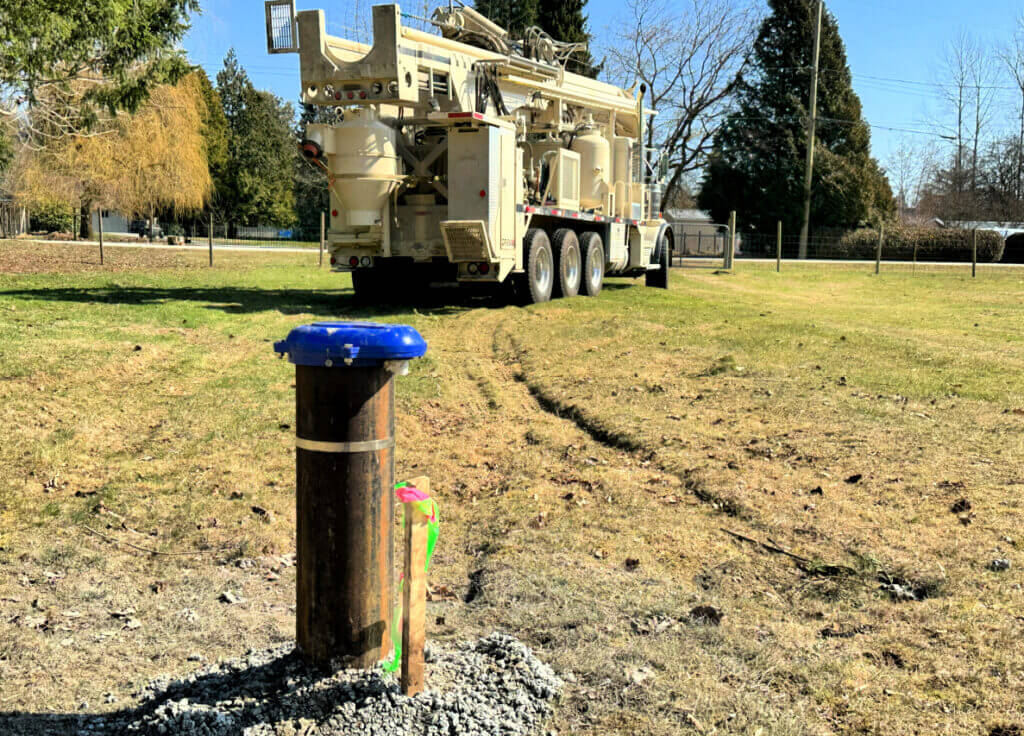Well Pump Installations, Well Pump Repairs, Submersible Well Pump Replacement, Jet Pumps, Pressure Tanks, Water Storage Tanks, Home Water Treatment Systems, Water Well Inspections, and Water Testing
Township of Langley | Aldergrove | Brookswood-Fernridge | Fort Langley | Murrayville | Northwest Langley | Walnut Grove | Willoughby | Willowbrook | Forest Knolls | Glen Valley | Hopington | Milner

Langley Well Pump provides a broad scope of expert water well pump services throughout the Township of Langley.
The Most Common Questions for Langley Well Pump:
We are happy to answer your questions at Langley Well Pump! Don’t hesitate to connect with Jenna and our online water systems team; we are here to help without the long wait for a telephone callback.
Do you need help with your water well pump? No water in the tap? We’ll get your water back for you quickly!
Langley Well Pump & Repair provides reliable water well service, including Submersible Pump Installation, Well Pump Repairs, Pressure Tank Replacement, Shallow Well Jet Pumps, Irrigation Pumps, Sump Pumps, Water Storage Tanks, Water Well Inspection, Water Testing, Home Water Treatment System for the Township of Langley.
Our Langley service area includes the Township of Langley, Aldergrove, Brookswood-Fernridge, Fort Langley, Murrayville, Northwest Langley, Walnut Grove, Willoughby, Willowbrook, Forest Knolls, Glen Valley, Hopington, and Milner.
We offer online estimates for residential, commercial, and agricultural well pump repairs, installations, and other general services.
Are you planning to drill a new water well in the Langley area? Langley well pump is here to assist with the process, and it’s best to speak with us before drilling a well in Langley. We can offer many practical and cost-saving new water system tips!
Would you like a detailed well pump cost estimate for new water systems? We include the complete equipment package and installation for your budgeting purposes!
Call for emergency well pump repair; we are ready with fully-stocked service trucks, certified well pump installers, and a Langley well pump repair service department.

With the Township of Langley’s hundreds of sprawling farms and beautiful rural properties, we heavily depend on groundwater for many purposes. From irrigation for local crops to domestic water supply for homes, water wells and pumping systems are pivotal in the community. Given Langley’s agricultural prominence, a clean, continuous water supply can greatly impact the economy.
Professionals in the Langley well pump industry recognize the distinct hydrogeological characteristics of the Langley area of the Fraser Valley, often requiring specialized approaches for well pump installation and management.
Moreover, with Langley’s unique geographical and hydrological features, the choice and maintenance of well pumps become even more critical.
An efficient and durable pump ensures property owners, farmers, and businesses can handle water shortages, especially during peak summer months when the demand for water increases as supply may greatly decrease. Langley Well Pump & Repair is here to help you all year long.
Langley exhibits varied groundwater characteristics, with both confined and unconfined aquifers. The quality, depth, and availability of groundwater sources influence the selection and design of well pump systems in Langley and the surrounding area.
When it comes to extracting groundwater in Chilliwack, there are a few common technologies:
High-capacity Submersible Pumps: For deeper aquifers, multi-stage submersible pumps, often with variable frequency drive (VFD) controls, optimize efficiency and adapt to fluctuating water demand. Constant pressure systems are commonly installed in water wells throughout Chilliwack and are perfect for drilled wells.
Jet Pumps with Enhanced Priming Mechanisms: Often referred to as suction pumps with advanced self-priming capabilities, the latest jet pumps ensure reduced downtime, especially in areas with fluctuating water table levels.
Centrifugal Pumps with Dynamic Flow Control: Modern centrifugal pumps incorporate advanced flow control mechanisms for shallow wells to ensure consistent water pressure.
Given the essential nature of groundwater extraction in Langley, predictive maintenance and real-time monitoring are becoming industry norms. Leveraging IoT sensors and data analytics, professionals can now pre-empt water pump failures, track aquifer depletion rates, and optimize extraction processes.
Properly sizing a water well pump is crucial for efficient operation and ensuring that it meets the water supply demands of a household or other application.
Before selecting a well pump, you should know the water demand at the highest usage periods, also known as peak demand. Check our guide to determining peak water demand in our Langley Well Pump FAQ.
Check the water well yield or the amount of water it can provide over a specific period. If the pump’s capacity exceeds the well’s output, you could end up pumping your water well dry. Sizing a pump to stay within your well’s yield is crucial to ensure a consistent water supply.
A water pump system’s total head (TDH) is determined by several factors, such as the vertical distance from the water level in the well to the discharge point, friction loss in the piping, and the necessary pressure at the point-of-use, such as filling a pressure tank or overcoming elevation changes.
Based on the depth of your water source, you might need a specific type of pump:
Shallow well pump (or jet pump): Best for wells up to 25 feet deep.
Deep well jet pump: For wells between 25 to 110 feet deep.
Submersible pump: Ideal for wells deeper than 25 feet.
While it’s crucial to meet your current water demands, choosing a pump that operates efficiently to save energy costs in the long run is also wise. Additionally, plan for any future increases in water demands (e.g., if you plan to expand your home or irrigate more land) and choose a pump that can handle your possible future water needs. Providing your water source can provide for your potential future water demands.
Remember, working with the Langley Well Pump team can be invaluable. We have the experience to do the job! We guide you through the process, ensuring that the well pump you select is best suited for your needs.
As industry leaders, our responsibility is to ensure sustainable water extraction while leveraging cutting-edge technology, keeping Langley’s groundwater systems robust for generations to come.
Owning a rural property in Langley involves its fair share of responsibilities, often including maintaining or replacing a well pump. If you need to become more familiar with well pumps, fear not! We’re here to break down the process of a water well pump replacement and how Langley Well Pump & Repair can help save money!
Like any equipment, a water well pump will have its lifespan. A well pump will inevitably need to be serviced or replaced.
Among property owners, one of the most common concerns in Langley is the potential expense associated with well pump replacement or servicing. The good news? There are ways to mitigate these costs.
When you suspect an issue with your well pump, having a wealth of information on hand can be your best ally. To request the cost of replacing a well pump on your Langley property, gather some details about your well pump problem.
This information helps you understand the scale of the problem but also helps us with insights, potentially reducing the time to diagnose your water pump concern.
Beyond the immediate problem with your well pump, you can take another crucial step to help reduce costs: meticulous record-keeping.
Here’s a checklist of details you should always have on file:
While being prepared is half the battle, selecting the best well pump company in Langley is equally important.
Our Final Thoughts
Water well pump replacement in Langley doesn’t have to be daunting, nor does it need to break the bank. Remember, the value of understanding your water system, maintaining detailed records, and communicating as needed with Langley Well Pump & Repair. Here’s to a hassle-free water well pump experience on your rural property!
There are plenty of shallow wells in the Township of Langley. A shallow-well pump, often called a jet pump, is suitable for relatively shallow wells, usually up to about 25 feet deep.
Here’s a Breakdown of the Suitability of a Jet Pump:
If your well depth exceeds 25 feet, or if you’re close to that depth and concerned about efficiency, it’s a good idea to consider a deep well pump or a submersible pump instead. These submersible pumps can pump water from hundreds of feet below ground and handle much greater depths.
There are plenty of shallow wells in the Township of Langley. A shallow-well pump, often called a jet pump, is suitable for relatively shallow wells, usually up to about 25 feet deep.
Here’s a Breakdown of the Suitability of a Jet Pump:
If your well depth exceeds 25 feet, or if you’re close to that depth and concerned about efficiency, it’s a good idea to consider a deep well pump or a submersible pump instead. These submersible pumps can pump water from hundreds of feet below ground and handle much greater depths.
1.Assign Gallons Per Minute (GPM) to Each Fixture:
Faucet: 1-2.5 GPM
Toilet: 3-5 GPM for short flush durations
Shower: 2-5 GPM (depending on the type of showerhead)
Washing Machine: 3-5 GPM
Dishwasher: 2-4 GPM
Hose Bib (outdoor faucet): 3-10 GPM (depending on hose diameter and length)
Remember, these are just average values. It’s always better to check the manufacturer’s specifications for precise GPM ratings.
2. Determine Simultaneous Water Demand:
Figure out the highest possible simultaneous water usage. For a home, this might be during the morning or evening when multiple people could be using water simultaneously. For example, two showers might be in use along with a washing machine.
3. Calculate Total Peak Demand:
Multiply the GPM of each fixture by the number that you believe will be used simultaneously.
Sum up these numbers.
For example, if you have:
Two showers at 5 GPM each = 10 GPM
One washing machine at 4 GPM = 4 GPM
Your total peak demand would be 14 GPM.
4. Add a Safety Factor:
Adding a safety factor (10-25%) to your estimated peak demand can account for any inaccuracies or unexpected future water requirement increases.
5. Consider Static and Dynamic Pressure:
While this is a quick guide to sizing based on demand, it’s also essential to consider the well’s depth, elevation changes, and other factors that affect pump sizing. The static level (resting water level) and dynamic level (water level when the pump is working) can influence the pump’s power needs.
6. Select a Well Pump:
Once you’ve determined the peak water demand, choose a pump that can meet or exceed this demand. It’s always better to have a pump that can provide more than the exact peak demand rather than one that might fall short.
7. Regularly Review and Adjust:
As families grow, homes get expanded, or fixtures get added/changed, the water demand can increase. Reviewing and adjusting your pump size or settings every few years or after significant changes to your home is a good idea.
Lastly, consult with Langley Well Pump & Repair, especially when dealing with specifics related to available water supply, well depths, geology, and pump technology. Ensuring the right pump size and type for your situation is very important.
Langley Well Pump & Repair provides online estimates for a water well pump replacement cost in the Township of Langley.
Water quality is a top priority in Langley, especially for rural property owners sourcing water from private wells. Unlike municipal water systems that are regularly monitored and treated to meet strict safety standards, private wells are the property owner’s responsibility.
Regular well water quality testing in Langley is essential for safeguarding public health.
Contact Langley Well Pump to obtain the required bottles for testing your Chilliwack area well water.
Langley Well Pump & Repairs
Water Well Pump Installations, Well Pump Repairs, Submersible Well Pump Replacement, Water Storage Tanks,
Water Treatment & Filtration, Water Well Inspections, and Water Test Kits
Township of Langley | Aldergrove | Brookswood-Fernridge | Fort Langley | Murrayville | Northwest Langley | Walnut Grove | Willoughby | Willowbrook | Forest Knolls | Glen Valley | Hopington | Milner